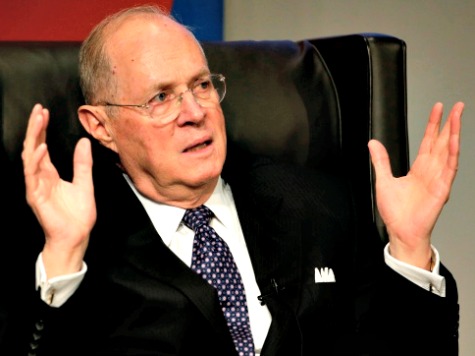Supreme Court Justice Anthony Kennedy, speaking at the annual conference of the Ninth U.S. Circuit Court of Appeals in Monterey, waxed eloquent on the deficiencies of the Constitution and implied that those who believe in the original intent of the Constitution by swearing fealty to the original, literal meaning are misguided.
Most of Kennedy’s nearly hour-long speech focused on the Magna Carta, originally signed in 1215 and due for its 800th anniversary next year. But he couldn’t resist taking a swipe at the Constitution, noting, “The Constitution of the United States is a flawed document,” its “thinly veiled language… basically reaffirmed the legality of slavery.” Kennedy was referencing the section of the Constitution in which each slave was defined as three-fifths of a person in the estimation of how many congressional delegates each state was allotted. He added that the soldiers who died in the Civil War were “one of the things it cost for having a Constitution that was flawed.”
Turning to those who champion originalism, Kennedy lectured that the drafters of the Constitution wanted principles that could be reinterpreted by justices of the future. He said, “The framers were wise enough to know that they could not foresee the injustices” of the future, “so they used general language.”
Tweaking fellow justice Antonin Scalia, a stout originalist, Kennedy defended Scalia’s 2008 ruling that reversed a ban on handguns in Washington, D.C. He added that the Second Amendment protects the rights of citizens to own certain firearms at home. The Second Amendment had been interpreted up until 1939 to protect only the right to bear arms in a “well-regulated militia.”
Doubling down on the court’s right to veer from the Constitution’s original intent, Kennedy mentioned Plessy vs. Ferguson (1896), which upheld segregation in public transportation as “separate but equal.” That decision was reversed by the 1954 Brown vs. Board of Education decision, which banned school segregation and used the Fourteenth Amendment to guarantee equal treatment of different races.
Tempering himself slightly, Kennedy disavowed claims that because it took so long for the court to support the individual right to keep and bear arms, that “means that it doesn’t exist.” He stated, “I’m not so sure.”
He had to say that; he was on Scalia’s side in the 5-4 ruling in 2008.

COMMENTS
Please let us know if you're having issues with commenting.